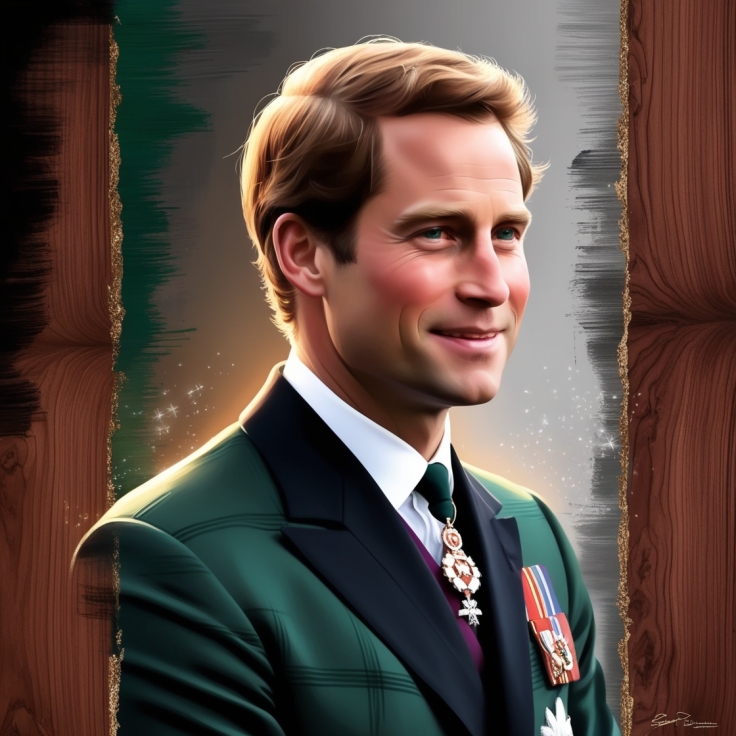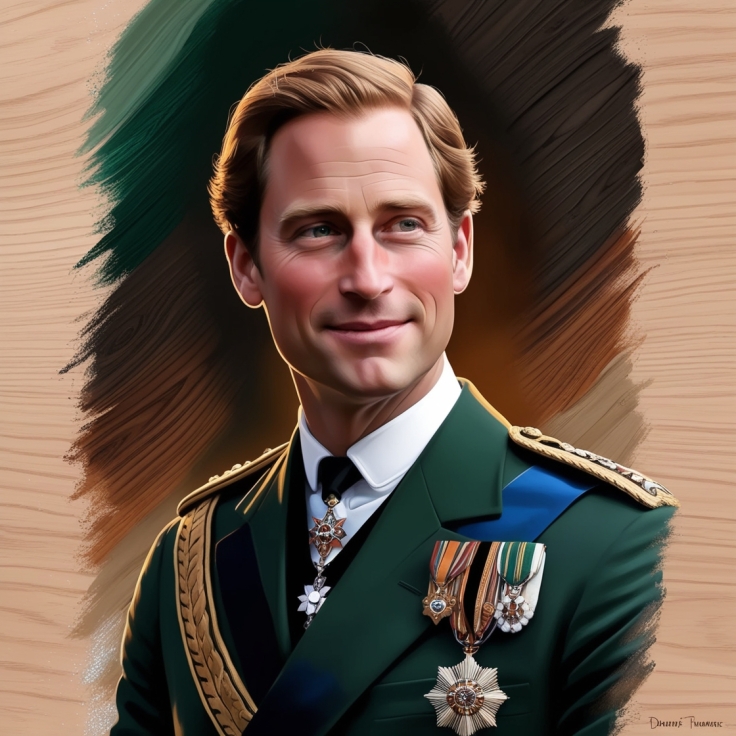Prince William, the Duke of Cambridge, was born on June 21, 1982, at St Mary’s Hospital in London, England. He is the eldest son of Prince Charles, the Prince of Wales, and Diana, Princess of Wales. From birth, Prince William was thrust into the spotlight as a member of the British royal family, which garnered him significant media attention and public interest from an early age.

His upbringing was marked by the complexities of royal life and the intense public scrutiny that accompanies it. Following his parents’ separation and subsequent divorce in 1996, Prince William, along with his younger brother Prince Harry, became a focus of media attention worldwide. Despite the challenges of growing up in the public eye, Prince William received a strong foundation of support from his family, particularly from his mother, who was known for her warmth and compassion.
Education played a crucial role in Prince William’s upbringing. He attended independent schools, starting at Mrs Mynors’ Nursery School and later Ludgrove School. In 1995, he enrolled at Eton College, where he excelled academically and participated actively in extracurricular activities, including sports and the arts. His education at Eton College provided him with a well-rounded foundation that prepared him for his future roles within the royal family and beyond.
Following his time at Eton, Prince William took a gap year, during which he traveled and engaged in various community service projects. This experience deepened his understanding of global issues and reinforced his commitment to public service. In 2001, he began studying at the University of St Andrews in Scotland, where he pursued a degree in History of Art. During his university years, Prince William led a relatively low-profile life compared to his earlier years, focusing on his studies and developing his personal interests.
After completing his degree at St Andrews, Prince William embarked on a career in the military. He joined the British Army and underwent officer training at the Royal Military Academy Sandhurst. In 2006, he was commissioned as a Second Lieutenant in the Blues and Royals regiment of the Household Cavalry. Prince William served in various roles, including pilot training with the Royal Air Force and later as a search and rescue pilot with the Royal Air Force’s Search and Rescue Force.
Prince William’s military service was a formative experience that instilled in him a strong sense of duty and camaraderie. His commitment to serving his country was evident throughout his military career, which included deployments and operational roles that underscored his dedication to public service.

In summary, Prince William’s upbringing, education, and military service have shaped him into the dedicated and compassionate individual he is today. His experiences have influenced his approach to his roles within the royal family, emphasizing the importance of duty, service, and a commitment to making a positive difference in society.
Prince William, the Duke of Cambridge, has emerged as a prominent global advocate for environmental conservation and sustainability. His commitment to preserving the natural world is not just a personal passion but a cornerstone of his public role, influencing policies and initiatives worldwide. Prince William’s deep concern for the environment stems from a profound understanding of its crucial role in supporting life on Earth. He emphasizes the urgent need for collective action to combat climate change, protect endangered species, and conserve biodiversity.
Central to Prince William’s environmental advocacy is the recognition that current human activities are severely impacting ecosystems globally. From deforestation to pollution, these activities endanger not only wildlife but also human health and well-being. His initiatives, such as the Earthshot Prize, aim to inspire and fund innovative solutions to environmental challenges. By promoting collaboration across sectors and regions, Prince William encourages a holistic approach to sustainability that integrates environmental, economic, and social considerations.
Moreover, Prince William champions education and awareness as fundamental tools for fostering a sustainable future. He advocates for integrating environmental studies into school curricula and raising public awareness about the importance of individual actions in reducing carbon footprints and promoting responsible consumption. His efforts extend beyond rhetoric; Prince William actively engages with scientists, policymakers, and grassroots organizations to catalyze meaningful change.
Prince William, the Duke of Cambridge, has emerged as a staunch advocate for mental health awareness and support, recognizing its pivotal role in individual well-being and societal health. His advocacy represents a significant departure from traditional royal protocols, focusing on destigmatizing mental health issues and promoting open dialogue.
Prince William’s commitment to mental health advocacy is deeply personal, shaped by his experiences as a member of the royal family and the pressures that accompany public life. He has openly discussed his own struggles with mental health, acknowledging the importance of seeking help and breaking the silence surrounding psychological challenges. By sharing his journey, Prince William encourages others to prioritize their mental well-being and seek support without fear of judgment or shame.
In his role, Prince William has championed initiatives such as Heads Together, a campaign he co-founded with the Duchess of Cambridge and Prince Harry. This campaign aims to change the conversation around mental health and provide resources for those in need. Through partnerships with various organizations, Heads Together promotes mental resilience, educates the public on mental health issues, and supports access to mental health services.
Beyond raising awareness, Prince William has advocated for systemic change in how mental health is perceived and addressed within society. He has called for increased funding for mental health services, better integration of mental health support in schools and workplaces, and improved access to treatment for all individuals, regardless of background or circumstance. His efforts highlight the interconnectedness between mental health and overall well-being, underscoring the need for a compassionate and inclusive approach to mental health care.

Prince William’s family life has been a cornerstone of his identity, marked by significant milestones including his marriage, charitable endeavors, and public engagements. His marriage to Catherine Middleton, now known as Catherine, Duchess of Cambridge, on April 29, 2011, at Westminster Abbey, captured global attention and symbolized a new chapter for the British monarchy. The couple’s relationship, which began during their time as students at the University of St Andrews, has been characterized by mutual support, shared interests in charitable work, and raising a family.
As parents, Prince William and Catherine have three children: Prince George, Princess Charlotte, and Prince Louis. Their approach to parenting reflects a blend of royal tradition and modern values, emphasizing a balanced upbringing that includes exposure to charitable work and public service from a young age. The family’s public appearances and milestones, such as the births of their children and their official engagements, continue to be a focus of media and public interest worldwide.
In terms of charitable activities, Prince William and Catherine are active patrons of numerous organizations focused on mental health, conservation, and support for young people. They are patrons of the Royal Foundation, which supports initiatives such as Heads Together, a mental health campaign aimed at reducing stigma and promoting mental well-being. Through their charitable work, the Duke and Duchess of Cambridge strive to make a positive impact on issues they are passionate about, leveraging their platform to raise awareness and funds for various causes.
Prince William’s public engagements encompass a wide range of responsibilities as a senior member of the royal family. He undertakes official visits both domestically and internationally, representing the British monarchy and supporting diplomatic relations and charitable causes. His engagements often highlight issues related to mental health, conservation, veterans’ affairs, and youth empowerment, reflecting his commitment to addressing global challenges and promoting positive change.
In summary, Prince William’s family life, marriage to Catherine, charitable activities, and public engagements collectively underscore his role as a modern royal figure dedicated to service, advocacy, and making a difference in society. His approachability, compassion, and commitment to causes close to his heart continue to resonate with people around the world, reinforcing his influence as a leader and advocate for positive social change.
Prince William’s royal duties and public role are defined by a commitment to service, diplomacy, and leadership within the British monarchy. As the future King of the United Kingdom, he carries out a diverse array of royal responsibilities that encompass ceremonial duties, representing the Crown at home and abroad, and promoting national unity and goodwill.
His royal engagements include attending state occasions, ceremonies, and official functions that uphold the traditions and values of the monarchy. Prince William participates in events that celebrate British culture, history, and achievements, reinforcing the monarchy’s role as a symbol of continuity and national identity. His presence at these events fosters a sense of connection and pride among the British people.
Internationally, Prince William serves as a global ambassador for the United Kingdom, promoting diplomatic relations and cooperation with other nations. His overseas visits and engagements support British interests, cultural exchange, and humanitarian efforts, reflecting his role as a statesman and advocate for international collaboration.
In terms of achievements, Prince William has spearheaded initiatives that have had a significant impact both within the United Kingdom and globally. His work in mental health advocacy, through initiatives like Heads Together, has helped reduce stigma and improve access to mental health support services. The Earthshot Prize, another of his initiatives, aims to inspire innovative solutions to environmental challenges, demonstrating his commitment to sustainability and global conservation efforts.
Prince William’s personal influence extends beyond his official duties, resonating with people worldwide due to his approachability, empathy, and dedication to charitable causes. His public support for issues such as mental health, conservation, and youth empowerment has amplified awareness and encouraged positive change. By sharing personal experiences and leading by example, he has inspired individuals and organizations to address societal challenges proactively and compassionately.
In conclusion, Prince William’s role as a senior member of the British royal family is characterized by a steadfast dedication to duty, service, and leadership. His royal commitments, achievements in advocacy and charitable work, and personal influence collectively reinforce his position as a respected figure both within the United Kingdom and on the global stage. As he continues to fulfill his responsibilities and pursue his passions, Prince William’s impact on society and his legacy as a future monarch remain significant and enduring.



Leave a comment